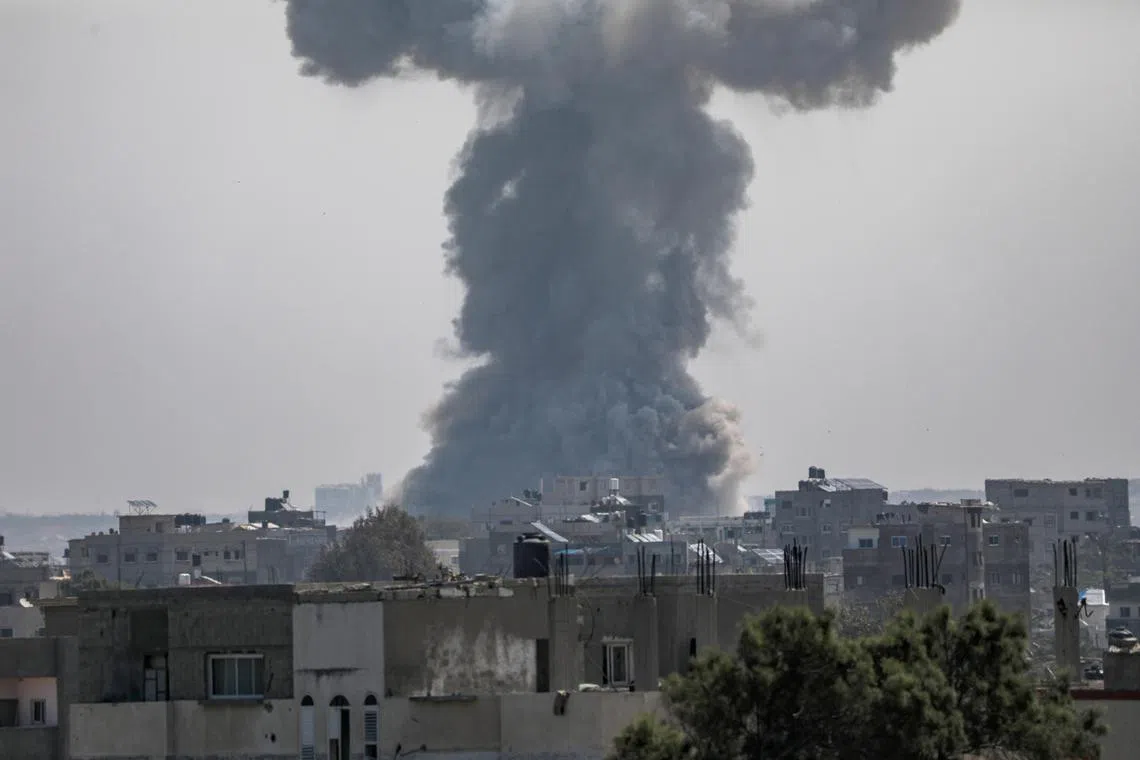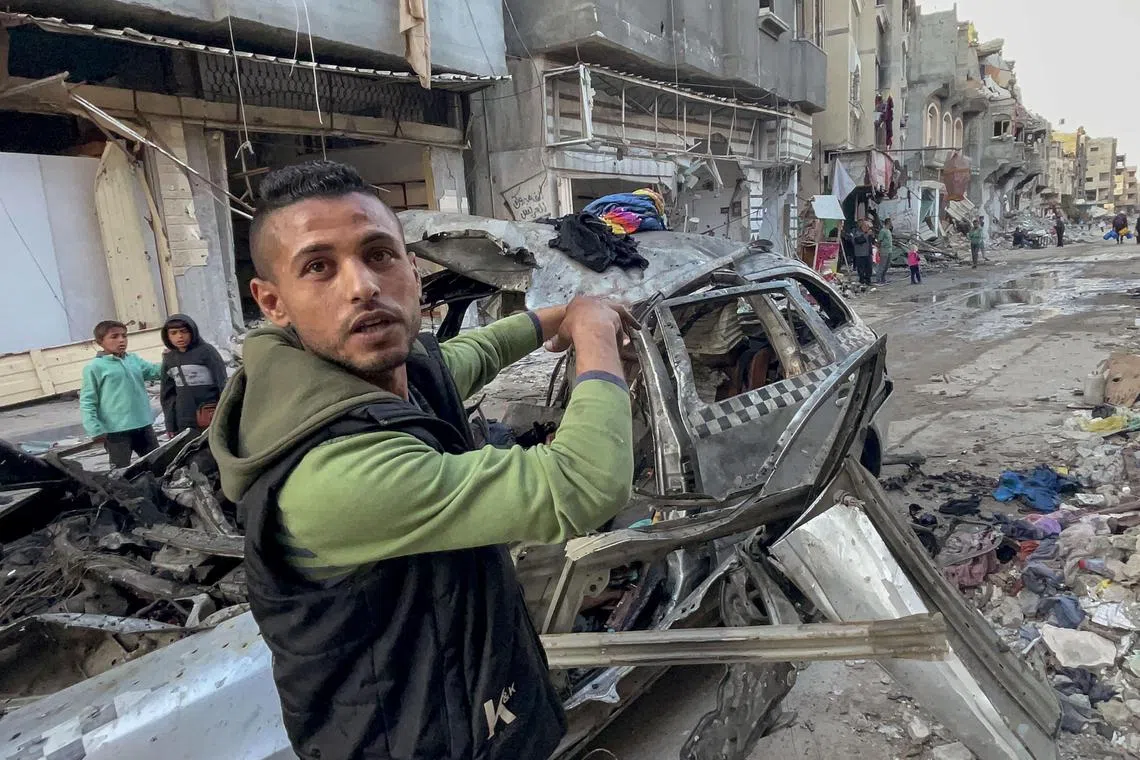Israel pounds Gaza as Iran attack threat puts region on edge
Sign up now: Get ST's newsletters delivered to your inbox

Smoke rises during an Israeli military operation at a refugee camp south of Gaza City on April 12.
PHOTO: EPA-EFE
GAZA STRIP, Palestinian Territories – Residents reported heavy Israeli fire in central Gaza on April 12, with regional tensions soaring after Iran threatened reprisals over a strike in Syria in April that killed two Iranian generals.
As ceasefire talks aiming to pause the six-month-old war dragged on, fears that Iran could soon launch an attack on Israel spurred France to recommend its citizens to avoid travelling to the region.
Mr Mohammed al-Rayes, 61, said he fled Israeli “air strikes and artillery shelling” in Nuseirat in central Gaza overnight.
“It was all fire and destruction, with so many martyrs lying in the street,” he said.
Another resident, Ms Laila Nasser, 40, reported “shells and missiles” throughout the night.
“They will do to Nuseirat what they did to Khan Younis,” she said, vowing to flee to the southernmost city of Rafah, like most of Gaza’s population.
Israel last week pulled its troops from the devastated city of Khan Younis after months of fighting, but officials said they were preparing for operations against Hamas militants in Rafah, near the Egyptian border.
The authorities in the Hamas-ruled coastal Palestinian territory on April 12 reported dozens of new air strikes in Gaza’s central region.
The Hamas media office said 25 people were taken to hospital in Deir al-Balah city “as a result of an air strike on a house of the al-Tabatibi family”.
Syria strikes
Israel’s military said its aircraft struck more than 60 militant targets in Gaza the previous day.
The war began with Hamas’ unprecedented Oct 7 attack against Israel
Israel’s retaliatory offensive has killed at least 33,634 people in Gaza, mostly women and children, according to the territory’s Health Ministry.
The ministry’s updated toll on April 12 included at least 89 deaths over the previous day.

A man in front of the car where three sons of Hamas leader Ismail Haniyeh were reportedly killed in an Israeli air strike on April 10.
PHOTO: AFP
The latest bombardments in Gaza came after Israel said it was strengthening air defences and paused leave for combat units, following a deadly April 1 air strike that destroyed Iran’s consulate building in Damascus.
Iran blamed Israe
Among the targets have been fighters from Lebanon’s Hezbollah movement in Syria. The group has also exchanged regular deadly fire with Israel over the Lebanese border since last October.
Iranian Foreign Minister Hossein Amirabdollahian said late on April 11 that he received phone calls from German Foreign Minister Annalena Baerbock, as well as her British and Australian counterparts.
‘Significant attack’
In a post on social media platform X, the Iranian minister said he told them that “when the Zionist regime breaches the immunity of diplomatic persons and places” and the UN Security Council fails to condemn it, “legitimate defence... is a necessity”.
He added that “Iran does not seek to expand the scope of the war”.
US President Joe Biden on April 10 said Iran is “threatening to launch a significant attack on Israel”, and pledged “ironclad” support for Washington’s top regional ally
General Michael Kurilla, head of the US Central Command, was in Israel on April 11 to discuss the situation with Defence Minister Yoav Gallant, the Pentagon said.
France on April 12 warned its nationals against travelling to Iran, Israel, Lebanon or the Palestinian territories, after the US embassy in Israel announced it was restricting the movements of its diplomats over security fears.
Moscow and Berlin urged restraint.
German airline Lufthansa extended a temporary suspension of flights to and from Teheran until April 13.
In their October attack, Hamas militants seized about 250 hostages, 129 of whom remain in Gaza, including 34 who the Israeli army says are dead.
Israeli Prime Minister Benjamin Netanyahu leads a coalition government which includes religious and ultra-nationalist parties, and is under pressure from anti-government protesters and relatives of the hostages demanding that the government bring them home.
Tens of thousands have taken to the streets. On April 11, hundreds demonstrated near Mr Netanyahu’s Jerusalem home with a different call: for the war to continue.
Father’s appeal
“You, members of the Cabinet, must state clearly that the fighting will not stop, that the IDF (Israel Defence Forces) and our good sons will continue to crush the enemy until a complete victory,” said Mr Itzik Buntzel, the father of Israeli soldier Amit Buntzel who was killed in Gaza.
Washington has ramped up pressure on Mr Netanyahu to agree to a truce, increase aid flows and abandon plans to send troops into Rafah.
Mr Gallant said on April 10 that Israel would “flood Gaza with aid”
However, on April 11, the UN Security Council said “more should be done to bring the required relief, given the scale of needs in Gaza”.
The UN says famine is imminent in Gaza, much of which has been reduced to a bombed-out wasteland.
World Health Organisation chief Tedros Adhanom Ghebreyesus said an assessment team that visited Khan Younis found “destruction disproportionate to anything one can imagine” and three medical centres that were no longer functioning.
Truce talks that started on April 7 in Cairo have brought no breakthrough on a plan presented by US, Qatari and Egyptian mediators, which Hamas said it was studying.
The framework plan would halt fighting for six weeks and see the exchange of about 40 hostages for hundreds of Palestinian prisoners, as well as more aid deliveries.
Israel on April 11 accused Hamas of “walking away” from what government spokesman David Mencer called “a very reasonable offer on the table”.
Mr Bassem Naim from Hamas’ political bureau said a ceasefire is needed to locate Israeli hostages held by various groups across the territory and ascertain their fate. AFP


